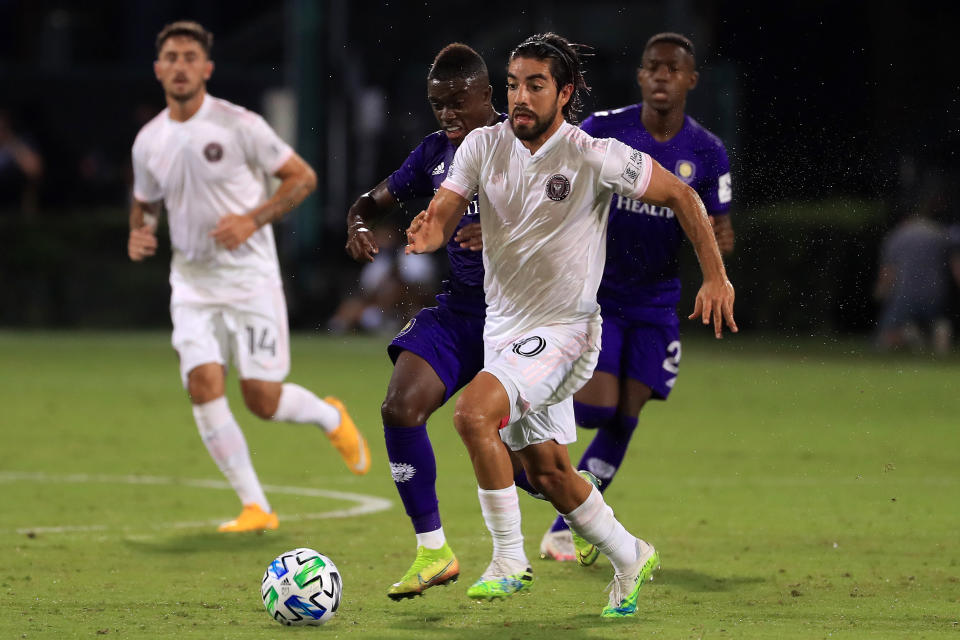MLS rushed to be first U.S. men's league back. If it exacerbates Florida's coronavirus spike, it made the wrong choice.
Major League Soccer is not a league prone to recklessness. Say what you will of the stateside soccer circuit celebrating its 25th season, but it has gotten here, far outlasting any other professional league in the United States, through remarkable discipline and long-term planning.
Which is why its insistence on resuming play in Florida has jarred.
MLS became the first major American men’s league to return to playing on Wednesday with an Orlando City-Inter Miami game at the ESPN Wide World of Sports complex at Disney World outside of Orlando. It was the opener of the tautological MLS is Back Tournament — a 2-1 Orlando win.
Like other leagues plan to, MLS has inflated an imaginary bubble around its 26 teams, supposedly keeping the pandemic out, although one team has already been sent home (FC Dallas) and another (Nashville) may well follow for an excess of positive cases. Nashville’s first game, scheduled as the second event on Wednesday’s opening slate, had to be postponed.
Outside of those two teams, the positivity rate is apparently quite low, but that isn’t the point.
The league’s resolve in following the National Women’s Soccer League back out onto the field, a week and a half later, was misguided.
Call it a bubble if you must, and insist that your players will be protected and looked after and even coddled in return for the inarguable risk they’re taking. But word soon leaked out that the bubble wasn’t nearly as impermeable or as cushy as had been promised. Even if those accounts are anecdotal and likely emanate from a band of skeptical and nervous players — and it’s hard to say how many of those there are — the larger issue is that a bubble is illusory. You cannot put an entire soccer league on an island, in the middle of Florida, and just pretend the risk has been mitigated.

What’s more, COVID-19 cases in Florida surged in the month before Wednesday’s game. Its new cases jumped from 966 on June 8 to, now, 14 straight days with at least 5,000 new cases — three of those days rose above 10,000. More than 50 Florida hospitals have run out of ICU beds. And Central Florida, where MLS has installed itself, is a coronavirus hotbed. Meanwhile, test results are facing new delays and protective equipment has become scarce once again.
MLS isn’t to blame for any of these things. But it is making them worse. In a climate of test diagnostic shortages, MLS bubble dwellers are getting one every other day during their first 14 days in the bubble. From then on, they’re tested twice a week. Between 25 teams, coaching and medical staffs, front office members, referees and league officials, the league gobbles up around 1,300 tests, multiple times per week. If an outbreak should happen within the bubble that requires hospitalizations, the burden will fall on local medical facilities that are already stretched.
But it isn’t just unfair on Central Florida, which has had it hard enough under a governor who spent months either ignoring reality or in conscious denial of it, which now has even more people to look after. It’s also unfair to the players, brought together with these clusters of people from all over the country to do something that is inherently dangerous right now: playing a sport that requires constant physical contact and players spitting and shouting in close proximity.
“I think it’s a little bit stupid, if I’m being honest,” LAFC striker Bradley Wright-Phillips has said, per ESPN. But few of his peers have dared to speak out like that.
Unlike Major League Baseball, where a slew of players has already announced that they will be sitting out the season over health concerns, most MLS players don’t have that option. While salaries have certainly risen, few can afford not to make money for a year, nor do they have the leverage to sit out a season and expect to come back. Tellingly, LAFC’s Mexican star Carlos Vela, the reigning MVP and Golden Boot, is one of only two MLS players to opt out of the MLS is Back Tournament on account of his wife’s pregnancy. The other, last year’s top draft pick, Inter Miami forward Robbie Robinson, did so for unclear reasons.
The league’s eagerness to return was certainly understandable, considering the financial implications of calling off any more of the season, and indeed the opportunity in being the first American men’s league back in action. But it returned at the wrong time, in the wrong place.
MLS is back, yes. MLS Is Back, even. But will it prove the right decision in the end? If a high-end soccer tournament winds up exacerbating Central Florida’s woes with this pandemic even marginally, the answer will be an empathic no.
Leander Schaerlaeckens is a Yahoo Sports soccer columnist and a sports communication lecturer at Marist College. Follow him on Twitter @LeanderAlphabet.
More from Yahoo Sports:

 Yahoo Sports
Yahoo Sports 
